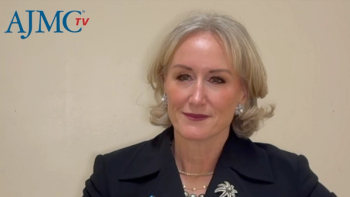
Empowering Patients With Metastatic Breast Cancer
Sonya Negley, IOM, CSMA, discusses ways to help patients with metastatic breast cancer feel empowered during their journey.
Episodes in this series

Sonya Negley, IOM, CSMA:I think the biggest thing we can do to help patients feel empowered in their journey is to help them share their voices. And that is in a lot of different ways. One, sharing their story, but also targeting that story to specific spaces. If we take our eyes off of things that happen on a national level, with congressional mandates, or things that change with insurance, it can be devastating to the metastatic breast cancer community. So, empowering patients to have a voice with their state and national representatives is critical. It’s critical to research, research funding, and maintaining proper payments for treatment, which is vital to all of the metastatic breast cancer community.
The other thing is making sure there is a voice of patients in the clinical trial space. That area is changing a lot in our current times. But having that patient voice to help researchers understand what is important when they’re developing research programs. A lot of times it’s a 1-size-fits-all program, and it doesn’t necessarily have to be that way. Inclusivity in clinical trials is very important. [We need to] make sure we help our researchers understand there are some differences with people of color, and we need to know what those are because that can lead to other discoveries in the metastatic breast cancer space.
We need to know why people of color, especially Black people, have worse outcomes, and we can’t do that without having those people of color involved in clinical trials and participating. [It’s about] sharing that information, helping everyone understand that you’re not going to be a guinea pig in a clinical trial, and you’re not going to go off treatment. You have options within that clinical trial space. A lot of it is education. Patient advocates can participate in that by saying, “Hey, this was my experience.” And patient advocacy organizations can help by encouraging patient advocates to take a deep dive and look at clinical trials, even as a treatment option. Possibly even a first-line treatment option. These are cutting-edge treatments that are being discovered. That is something to consider.
Finally, having a voice in what patients need to have a good quality of life, and that could be, can their treatment options be adjusted to help them be able to leave the house? Or [is there an alternative with] not as many adverse effects, or is there another option, possibly even a different treatment mechanism? So, it might be the same treatment, but it may be oral, or it may be adjusting the dosage. All of that input is incredibly important to science and in deciding how those treatments are administered, and what happens as [patients] move through their metastatic breast cancer journey.
Transcript edited for clarity.
Newsletter
Stay ahead of policy, cost, and value—subscribe to AJMC for expert insights at the intersection of clinical care and health economics.









